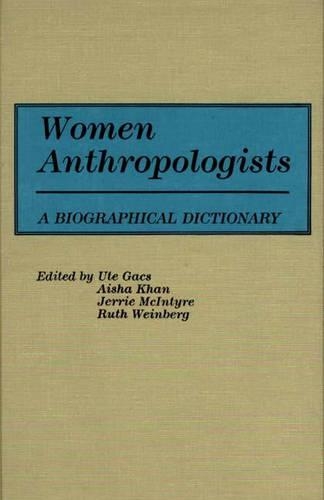
Women Anthropologists: A Biographical Dictionary
(Hardback)
Publishing Details
Women Anthropologists: A Biographical Dictionary
By (Author) Ute Gacs
By (author) Aisha Khan
By (author) Jerrie Mcintyre
By (author) Ruth Weinberg
Bloomsbury Publishing PLC
Greenwood Press
4th February 1988
United States
Classifications
Tertiary Education
Non Fiction
301.0922
Physical Properties
Hardback
445
Width 156mm, Height 235mm
851g
Description
A welcome resource and reference biographical dictionary that took five years to produce and is aimed at both graduate and undergraduate students in anthropology, history, and sociology. Each chapter is a brief autobiography that portrays the professional and personal lives--the triumphs and tribulations--of the brave, committed, first- and second-generation pioneers. . . . Well organized with useful appendixes, indexes, and references. Choice These concise biographies of a wide and interesting sample of women anthropologists make a valuable addition to the growing field of history of anthropology. As the editors point out, the careers of these women illuminate, usually by contrast, the factors that shaped the discipline of anthropology in its first century. The editors also note that these women's careers show far more `applied' and `popular' work than characterizes the careers of most prominent men anthropologists, and this difference calls into question the values implicit in much mainstream anthropology, implicit values often at odds with professed values. Alice B. Kehoe, Marquette University
Reviews
. . . The volume should become a standard reference for students of the history of anthropology. . . . I strongly recommend the volume to anyone interested in women's experience, particularly within the professions and academia.-Atlantis
A welcome resource and reference biographical dictionary that took five years to produce and is aimed at both graduate and undergraduate students in anthropology, history, and sociology. Each chapter is a brief autobiography that portrays the professional and personal lives--the triumphs and tribulations--of the brave, committed, first- and second-generation pioneers. The predominance of women in anthropology is impressive. They conducted research, published, bore heavy teaching loads, and reaped poor remunerations. However, it was not enough to demonstrate intellectual merit; gender determined appointment to academic positions. For example, Alfred Tozzer told Radcliffe students in 1939 that if they wanted to be anthropologists they had better have independent means because they will never get a job; the evidence from this volume vindicates Tozzer. Anthropology was a middle-class enterprise; perhaps that explains why in the 58 entries, only one subject is a Native American and four are Afro-American. The list is predominantly American and includes both widely known and less known anthropologists.-Choice
These concise biographies of a wide and interesting sample of women anthropologists make a valuable addition to the growing field of history of anthropology. As the editors point out, the careers of these women illuminate, usually by contrast, the factors that shaped the discipline of anthropology in its first century. The editors note also that these women's careers show far more "applied" and "popular" work than characterizes the careers of most prominent men anthropologists, and this difference calls into question the values implicit in much mainstream anthropology, implicit values often at odds with professed values. Because most of the subjects were personally interviewed, their biographies contain the subjects' own opinions of what was influential in their careers, a useful comparison to what might be analyzed out of the events and patterns. Women Anthropologists is a sourcebook for women's studies, history of anthropology, and social history; it is also a fascinating read.-Alice B. Kehoe, Professor of Anthropology, Marquette University
." . . The volume should become a standard reference for students of the history of anthropology. . . . I strongly recommend the volume to anyone interested in women's experience, particularly within the professions and academia."-Atlantis
"These concise biographies of a wide and interesting sample of women anthropologists make a valuable addition to the growing field of history of anthropology. As the editors point out, the careers of these women illuminate, usually by contrast, the factors that shaped the discipline of anthropology in its first century. The editors note also that these women's careers show far more "applied" and "popular" work than characterizes the careers of most prominent men anthropologists, and this difference calls into question the values implicit in much mainstream anthropology, implicit values often at odds with professed values. Because most of the subjects were personally interviewed, their biographies contain the subjects' own opinions of what was influential in their careers, a useful comparison to what might be analyzed out of the events and patterns. Women Anthropologists is a sourcebook for women's studies, history of anthropology, and social history; it is also a fascinating read."-Alice B. Kehoe, Professor of Anthropology, Marquette University
"A welcome resource and reference biographical dictionary that took five years to produce and is aimed at both graduate and undergraduate students in anthropology, history, and sociology. Each chapter is a brief autobiography that portrays the professional and personal lives--the triumphs and tribulations--of the brave, committed, first- and second-generation pioneers. The predominance of women in anthropology is impressive. They conducted research, published, bore heavy teaching loads, and reaped poor remunerations. However, it was not enough to demonstrate intellectual merit; gender determined appointment to academic positions. For example, Alfred Tozzer told Radcliffe students in 1939 that if they wanted to be anthropologists they had better have independent means because they will never get a job; the evidence from this volume vindicates Tozzer. Anthropology was a middle-class enterprise; perhaps that explains why in the 58 entries, only one subject is a Native American and four are Afro-American. The list is predominantly American and includes both widely known and less known anthropologists."-Choice
Author Bio
UTE GACS is a former coeditor of the Southwestern Anthropological Association Newsletter and the National Women's Anthropology Newsletter. AISHA KHAN is a Ph.D. candidate in Anthropology at the City University of New York Graduate Center. JERRIE MCINTYRE is affiliated with the School of Behavioral and Social Sciences at San Francisco State University. RUTH WEINBERG is coeditor of the Archaeological Survey and Excavation of San Pablo Reservoir.
